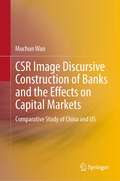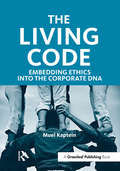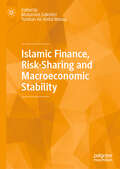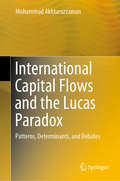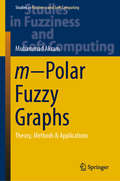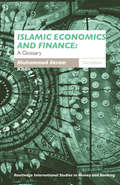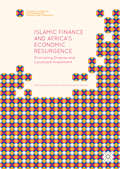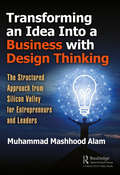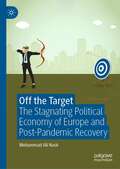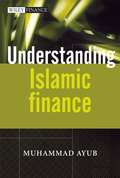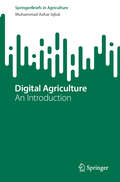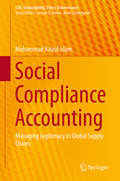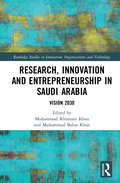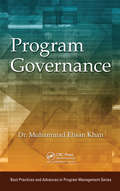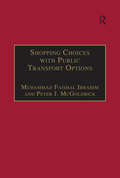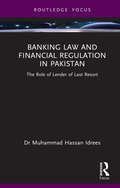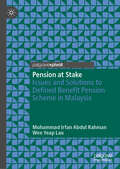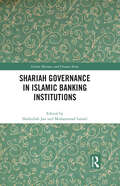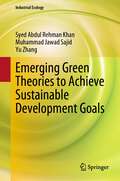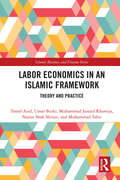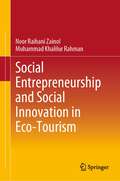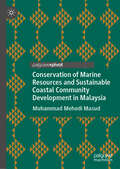- Table View
- List View
CSR Image Discursive Construction of Banks and the Effects on Capital Markets: Comparative Study of China and US
by Muchun WanThis book attempts to establish an inter-disciplinary discourse evaluation framework to analyze multi-dimensional discursive features along 4 dimensions in Chinese and American banks’ CSR reports: sentiment, readability, CSR keyword, and visualization. It analyzes Chinese and American banks’ different discursively constructed CSR images via the employment of various discursive features in CSR reports within their different contexts. Lastly, it examines the effects of Chinese and American banks’ discursively constructed CSR images on capital markets, with an inter-disciplinary approach of linguistics, management, and economics. Theoretically, this book contributes to the development of institutional identity’s cross-disciplinary research. Additionally, it reveals the problem-solving function of discourse. This sheds light on theoretical research into both corporate governance and business discourse. Practically, this book contributes to the improvement of Chinese banks’ awareness in CSR disclosure and the establishment of Chinese banks’ international images. Since more and more Chinese companies in different sectors are choosing overseas listings, findings in this book also have practical implications for their information disclosure, international images construction, and corporate value enhancement through corporate narratives, such as annual reports and IPO prospectuses.
The Living Code: Embedding Ethics into the Corporate DNA
by Muel KapteinOf the 200 largest organizations in the world, more than 80% currently have a corporate code of conduct. An ever larger number of smaller organizations also have a code or are in the process of developing one. While in the 1970s and 1980s companies had to explain why they had a code, today they are cross-examined if they don't have one. A company has to have very good arguments to convince stakeholders that they can do without a code.A business code is a measure for success: success as manager, employee, team and for the organization as a whole. Unfortunately, many codes are underutilized. And many simply fail, with serious repercussions for the organization.This short and accessible book presents a model to create, develop and embed business codes. The validated model enables managers and organizations to better manage their codes as well as their performance. The author articulates why a code of conduct is necessary, what it should cover, as well as demonstrating through practical tips and examples how to make full use of it. What is required to breathe life into a code and keep it that way? How can you live your code? Illustrated with results from an empirical study of the "Fortune" Global 200, the ideas developed are based on the worldwide experience of the consultancy firm KPMG. The author works in the field of developing, implementing and monitoring of codes, as well as conducting intensive academic research in the last 15 years in his capacity as (associate) professor of business ethics.The Living Code is a unique book and will be essential reading for those that want to make a success of their code or are considering developing one. Readers will learn just how rich and threatening a code is and what it could mean for their organization, their team and themselves.
Innovation Networks in the German Laser Industry
by Muhamed KudicTechnological innovation is fundamental to firm performance and economic prosperity. The aim of this book is to contribute to an in-depth understanding of collective innovation processes by analyzing publicly funded R&D cooperation and innovation networks in the German laser industry. Standing in a neo-Schumpeterian tradition, it employs interdisciplinary analytical concepts and draws upon a unique longitudinal dataset from the laser industry that covers more than two decades of observations. In brief, the book makes a valuable contribution by exploring how and why firm-specific R&D cooperation activities and network positions, large-scale network patterns, and evolutionary network change processes affect the innovative performance of laser source manufacturers in Germany.
Islamic Finance, Risk-Sharing and Macroeconomic Stability
by Muhamed Zulkhibri Turkhan Ali Abdul ManapThe concept of risk-sharing in financial and social contracts is one of the unique features of Islamic finance. Many theoretical studies generally claim superiority of an Islamic financial system based on pure equity and participatory modes of financing, while empirical studies provide mixed results. Studies and discussions are needed to fully understand how Islamic finance could contribute to the ongoing discussion of financial stability. Against this background, this book addresses various aspects of Islamic finance and the risk-sharing mechanism contributions to the overall macroeconomic and financial stability. Undoubtedly, the findings and recommendation from this book should be of great interest not only to future academic researchers in the field of macroeconomic stability and Islamic finance, but also to policy makers and regulators who are keen on drawing lessons from Islamic finance experiences to prevent similar crisis in the future.
International Capital Flows and the Lucas Paradox: Patterns, Determinants, and Debates
by Muhammad AkhtaruzzamanThis book offers a comprehensive analysis of the debates on international capital flows, and presents a new evidence-based answer to the long-standing question of why capital doesn’t tend to flow from rich to poor countries as predicted by standard neoclassical theory – a puzzle known as the Lucas paradox. Further, the book reviews alternative approaches to conventional estimates of the marginal product of capital (MPK) and considers whether these estimates actually help us understand observed international capital flows.A rigorous quantitative approach is subsequently used to provide clear empirical evidence on the determinants of capital flows across borders. The findings of this empirical analysis suggest that generous economic policies on capital account convertibility are more influential than differences in institutional quality in terms of determining international capital flows. In closing, the relative importance of various types of political risk (e.g. expropriation and corruption) is examined. After determining that expropriation risk has one of the greatest effects on foreign direct investment (FDI), the book proposes an appealingly intuitive explanation for the lack of FDI flows to many capital-scarce developing countries.
m−Polar Fuzzy Graphs: Theory, Methods & Applications (Studies in Fuzziness and Soft Computing #371)
by Muhammad AkramThis book provides readers with an introduction to m-polar fuzzy graphs and m-polar fuzzy hypergraphs, covering both theories and applications. A special emphasis is given to m-polar fuzzy graphs at the aim of filling a gap in the literature, namely the absence of a mathematical approach to analyze multi-index, multipolar, and multi-attribute data. The book describes metrics and labeling in m-polar graphs, m-polar fuzzy matroids. It also discusses in detail important applications in decision-making problems and imaging processing. The book is expected to stimulate the curiosity of mathematics, computer scientists, and social scientists alike, and to provide both students and researchers with the necessary knowledge to understand and apply m−polar fuzzy graph theory.
Islamic Economics and Finance: A Glossary (Routledge International Studies In Money And Banking Ser. #Vol. 23)
by Tony Watson Muhammad Akram KhanIslamic economics and finance have increased in importance over the last few decades, with new Islamic financial institutions opening up and a number of important books published on the topic.This glossary, fully updated and revised for the new edition, uses easy to understand language to introduce terms used by Muslim scholars, historians and lega
Islamic Finance and Africa's Economic Resurgence
by Muhammad Al Bashir Muhammad Al AmineThis book analyzes Africa's unprecedented economic growth, the state of its financial sector, and the varied opportunities for Islamic finance investors. It considers the role - potential and realized - of Islamic finance in fostering financial inclusion in areas such as banking, microfinance, capital market development, insurance, and private equity business. The book stresses that investing in Africa through Islamic finance will open new markets, ensure higher profit margins, diversify risk, and create business competition; and that these changes that will provide financial products that can satisfying the desires and beliefs of all consumers and unlock the real potential of the continent's financial system. The book also looks into the rise of international interest in Africa and concludes by scrutinizing the challenges impeding further economic growth, as well as the specific barriers that need to be addressed in order to promote the implementation of Islamic finance. Investors, policymakers, and academics ready to confront these challenges will find much of value in this book.
Transforming an Idea Into a Business with Design Thinking: The Structured Approach from Silicon Valley for Entrepreneurs and Leaders
by Muhammad AlamWe are living in fascinating times, when the power of technology is not just reshaping, but is transforming the globe in unprecedented ways. These include the ability to connect with anyone across the globe in an instant using a tiny device in the palm of our hands to the availability of self-learning systems to take over, not only the most mundane of tasks, but the most sophisticated tasks previously thought to be performable only by superior human faculties. Regardless of whether you consider this progress to be beneficial to society or harmful, these technological advancements are here to stay. On one hand, these current transformational technological advancements threaten this stability of society. On the other hand, they present an opportunity for all of us to awaken our inner entrepreneurs. This book makes the transition from an employee to an entrepreneur smooth for the masses. Many of us have ideas to improve this world in some way and even feel strongly about some of those ideas at a deeper level. However, we find ourselves perplexed on two levels: 1. Where to start when building an idea into a business? 2. What are the various dimensions and activities needed to launch an idea into a business? This book will introduce you to a structured framework, called Transform3+1, to transform your idea into a business by following simple and specific steps spread across four stages. The framework is grounded in the belief that all solutions solve human problems using technology or otherwise. The first stage will help you understand the problem facing your target user by building empathy. Once you understand the problem, comes the stage of devising a solution in an iterative manner through prototyping the new concept and validating with the user. Most start-ups fail not because they didn’t find the right problem to solve for the target user or that their solution lacked technological prowess but because they could not figure out a sustainable business model. Third stage will focus on crafting a business model. And the final stage introduces you to a unique approach of managing risk associated with your venture. This unique framework leverages the principles of Design Thinking, agile development, and lean start-up combined in an easy to follow manner by anyone and helps transform ideas into business in a short timeframe with little or no investment.
Off the Target: The Stagnating Political Economy of Europe and Post-Pandemic Recovery
by Muhammad Ali NasirThis book describes the history of European integration and the Eurozone, before presenting ways in which the European Union can move forward. Charting integration from before the Second World War, the foundations of the Eurozone are examined to provide insight into the challenges faced by the European Union, including the Global Financial Crisis, over recent decades. The impact of TARGET2 and the European Monetary System are also discussed. This book aims to highlight ways that current challenges to European integration, such as the COVID-19 crisis, environmental degradation, and fiscal debt, can be overcome to promote economic growth and social advancement. It will be relevant to students, researchers, and policymakers interested in the political economy and European economic policy.
Energy and Environmental Security in Developing Countries (Advanced Sciences and Technologies for Security Applications)
by Muhammad AsifThis book presents a comprehensive account of the energy and environmental security perspectives of the developing countries. To address the subject comprehensively, it covers four geographically diverse clusters of developing countries from across the world. The regions particularly focused on are: South Asia, South East Asia, Sub Sahara Africa, and Latin America. It is a valuable contribution to the debate, and policy and research activities around the subjects of energy and environmental security in the developing countries and beyond.The book covers the interwoven subjects of energy security and environmental security in the context of developing countries for the first time. It discusses the latest dimensions, challenges, and solutions around taking into account technical, economic, social, and policy perspectives. It incorporates up-to-date data, case studies, and comparative assessment.This edited book has contributions from established as well as emerging scholars from around the world. It benefits a wide range of stakeholders from the fields of energy, environment, and sustainable development. It is of help to academics, researchers, and analysts in these fields besides having appeal for policymakers, and national and international developmental organizations. It also helps developing countries to learn from each other’s experiences.
Understanding Islamic Finance
by Muhammad AyubIn Understanding Islamic Finance Muhammad Ayub introduces all the essential elements of this growing market by providing an in-depth background to the subject and clear descriptions of all the major products and processes associated with Islamic finance. Key features include: Discussion of the principles of Islamic finance; Introduction to the key products and procedures that International Financial Institutions are using or may adopt to fund a variety of clients ensuring Sharī´ah compliance; Discussion of the role Islamic finance can play in the development of the financial system and of economies; Practical and operational examples that cover deposit and fund management by banks involving financing of various sectors of the economy, risk management, accounting treatment, and working of Islamic financial markets and instruments. This book is not only an important text for all banks and financial institutions entering this particular market with a commitment to building Islamic financial solutions, but is also essential reading for undergraduate and postgraduate students of Islamic finance.
Digital Agriculture: An Introduction (SpringerBriefs in Agriculture)
by Muhammad Azhar IqbalThe success of modern-day agriculture lies in the digitalization of agricultural systems. The primary aim of this book is to provide a starting point to understand the fundamentals and design of digital agriculture systems with reference to the enabling technologies that deal with the production, improvement, and protection of crops/plants and livestock. The other associated objectives of this book include the explanation of the design and deployment of IoT-based digital agriculture systems in such a simple way that agriculture students understand straightforwardly. Therefore, this book is an effort to partially fill the gap associated with the understanding of the development and deployment of digital agriculture systems (including both precision and smart farming). We believe that with the provided details of enabling technologies and their usage in digital agriculture systems, agriculture students will find it easier to comprehend the designing of small-/large-scale IoT-based digital agriculture systems. This book provides insight into different technologies, architectures, and case studies that will ultimately help students to understand the concept of Digital Agriculture and its related applications. It enables students to realize the importance of open issues and future challenges of digital agriculture systems.
Social Compliance Accounting
by Muhammad Azizul IslamThis book covers key discussions involving major US and European multinational companies (MNCs) that source products from suppliers in developing countries. Due to the transfer of production from developed to developing nations, there is an urgent need to establish social compliance as a new form of Corporate Social Responsibility (CSR) and a means by which MNCs can meet expected social standards. The cases described are internationally relevant and can be seen to reflect or represent the behavior of many MNCs and their suppliers in developing nations. The discussion offers essential insights into how different levels of social compliance risk and pressure (including broader stakeholder concerns) move managers to adopt or embrace particular social compliance accounting, reporting and auditing strategies. The book will help readers to understand the major concerns, challenges and dilemmas faced by management in the supply chains of MNCs, and proposes measures that can be taken to resolve those dilemmas. Most importantly, it develops a systematic method of assessing the social compliance performance of suppliers to MNCs. This includes highly detailed accounts of the social compliance performance of suppliers within the clothing industry (in a developing nation) that supply goods to the extensive US and European markets. The book offers a valuable guide, not only for corporate managers but also for practitioners, researchers, academics, and undergraduate and postgraduate business students.
Research, Innovation and Entrepreneurship in Saudi Arabia: Vision 2030 (Routledge Studies in Innovation, Organizations and Technology)
by Muhammad Khurram Khan Muhammad Babar KhanThis book provides valuable insights into the Kingdom of Saudi Arabia (KSA) through a comprehensive examination of Vision 2030, an ambitious economic plan by the KSA to reinvent and diversify its economy from a heavy dependence on hydrocarbon to knowledge-based resources. Research, Innovation and Entrepreneurship in Saudi Arabia: Vision 2030 discusses how this initiative will assist the government in achieving its envisioned goals by creating a culture of research, innovation and entrepreneurship. It studies the current state of the field as well as new policies and reforms in Saudi Arabia which encompass education systems, ICT infrastructure and a vibrant innovation landscape that includes academia, the public and private sectors and civil society. The authors present a number of real-life case studies as a model of inspiration for cross-sector development. The book provides a source of inspiration for other nations in studying the KSA’s determined and ambitious plans as a country in a transitioning journey, from a natural resources-based economy towards a knowledge-based country with considerable diversification in all sectors. This book is a useful reference for students, researchers and policy and decision-makers in understanding Saudi innovation and the economic diversification ecosystem.
Program Governance
by Muhammad Ehsan KhanAlthough program management has received much attention in recent books, program governance remains a relatively new subject. While selected books and standards touch on this important topic, few are devoted to program governance as a subject. This book fills that need.Program Governance provides a thorough understanding of governance while reviewi
Shopping Choices with Public Transport Options: An Agenda for the 21st Century (Transport and Society)
by Muhammad Faishal Ibrahim Peter J. McGoldrickIn recent years, the environmental, social and economic concerns regarding laissez-faire retail decentralization policies have resulted in an emergence of a global trend towards the provision of wider choices of good quality public transport modes in suburban areas. Existing research on transport choices to shopping areas simply looks at travel time, travel cost or distance as a measure of the 'deterrence' of getting to a retail outlet and has concentrated on the attributes of the retail outlets, thus neglecting the transport attributes. Based on a substantial study incorporating both quantitative and qualitative research, this engaging volume takes a more balanced view of both retail outlet and transport attributes. It employs a multi-method, sequential design to examine the many dimensions salient to how people evaluate transport options for shopping purposes and unravels many important issues in transport mode and retail destination choices.
Banking Law and Financial Regulation in Pakistan: The Role of Lender of Last Resort
by Muhammad Hassan IdreesThis book offers an analysis of the contemporary significance of the practice of Lender of Last Resort (LOLR) in Pakistan. Aiming to identify deficiencies in current financial system legislation, the book details the role of LOLR and its essential presence in establishing a resilient banking and financial system.Beginning with an assessment of the emergence of Central Banks as domestic financial regulators, the book draws from the principles of Walter Bagehot and Henry Thornton for LOLR rescue operations. Examining the International Monetary Fund’s (IMF) role as an international lender of last resort and scrutinising its rescue efforts, the book uses case studies of the Central Banks in the United Kingdom and the United States to suggest reforms for Pakistan’s system. It explores the causes of financial crises and evaluates the factors that have made LOLR an integral part of Central Banks’ responsibilities. It compares LOLR operations in the cases of AIG and Lehman Brothers in the United States and Northern Rock in the United Kingdom, comparing these two cases in Pakistan to pinpoint key gaps in the State Bank of Pakistan’s LOLR operations. Furthermore, it discusses the Basel Accord I, II, and III: the key international regulations for the banking sector.The book will be of interest to scholars and students in the field of financial and banking law.
Pension at Stake: Issues and Solutions to Defined Benefit Pension Scheme in Malaysia
by Wee Yeap Lau Muhammad Irfan Abdul RahmanThis book focuses on the Defined Benefit (DB) pension scheme for pensionable civil servants in Malaysia, as a result of the rapidly rising pattern of pension costs for public servants in the country. In doing so, the book explores various issues on the defined benefit pension fund that the Malaysian Government currently confronts. Chapter one provides an overview of the pension system in the country, covering only the civil service pension fund managed by the Retirement Fund (Incorporated), better known as KWAP. It also discusses the issues and challenges the pension system and pensioners face. Chapter two reviews the past studies, sets up empirical models and examines which are the determinants of pension cost. Chapter three examines the asset allocation and performance of the KWAP pension fund from the last 13 years since the Ministry of Finance established it as part of the pension reform. Based on the available pension assets and liabilities data, Chapter Four outlines the steps and makes the 10-year forecast to ascertain whether the pension fund will be underfunded or not in the future. Chapter five examines whether the pension fund is sustainable in the long run based on the four parameters using scenario-based simulation. In order to solve this problem, especially the longevity risk, Chapter six proposes issuing longevity bonds by the authority to mitigate the longevity risk faced by the KWAP pension fund. Put together, the book is an interesting compilation of facts, analysis and insights from this hotly debated issue the current government faces. It serves as a reference for the financial market industry, regulators, market practitioners, analysts, researchers, government authorities and universities.
Shariah Governance in Islamic Banking Institutions (Islamic Business and Finance Series)
by Muhammad Ismail Shafiullah JanShariah governance assumes the primary instrument through which Islamic Banking Institutions (IBIs) ensure the Islamicity of their products, services, operations, and internal environments. It is considered to be one the fundamental elements that differentiates IBIs from their traditional counterparts. Shariah Governance in Islamic Banking Institutions provides a critical overview of the key aspects pertaining to Shariah governance within Islamic financial institutions and presents a detailed analysis of its conceptual background. The authors have identified the unique issues that have emerged due to the integration of Shariah, namely the involvement of the Shariah supervisory board (SSB), in the corporate governance arrangements of Islamic banks. These issues relate to disclosure, transparency, independency, consistency, confidentiality, competency, and reputation. The book details the doctrines of Shariah pronouncements in Islamic banks, the importance of having a central advisory board at a regulatory level in the standardization of Islamic banking practices, as well as the competence required for Shariah supervisory board members. It provides a critical analysis of the Shariah governance framework in Pakistan and introduces the authors’ vision of an ideal Shariah governance framework. Furthermore, the chapters offer guidance in promoting effective policies for improving Shariah governance. This is one of the core challenges facing Islamic banks, namely, to ensure compliance with faith and provide legitimacy to the business of IBIs, and as such, the book will appeal to both the research and professional communities.
Emerging Green Theories to Achieve Sustainable Development Goals (Industrial Ecology)
by Yu Zhang Syed Abdul Khan Muhammad Jawad SajidThis book opens up a critical dimension to the field of industrial ecology. The book discusses the emerging green theories in industrial ecology and evolving practices adopted by businesses to achieve Sustainable Development Goals. The author(s) identifies valuable lessons to be learned and presents conceptual frameworks and ideas to guide future industrial ecology applications, which are integrated into the triple bottom line approach and have cornerstone value to achieving Sustainable Development Goals. Additionally, the book discusses the relevant economic theories that serve as the foundation for the presented green views. This elaboration of economic ideas reinforces our work's relevance to achieving a green economy. Therefore, this book is essential for industrial ecology scholars and those interested in ensuring an environmentally sustainable future.
Labor Economics in an Islamic Framework: Theory and Practice (Islamic Business and Finance Series)
by Muhammad Tahir Toseef Azid Umar Burki Muhammad Junaid Khawaja Nasim Shah ShiraziThe labor market in Islam is governed by the Islamic laws of fairness, justice, and reward that is equivalent to the job done. Most of the literature in the field discusses the normative aspect of the labor market, whereas few attempts can be seen to address more positive aspects. There is a need for new theoretical and empirical models for the Islamic labor market, which should differ from established approaches. This book provides a comprehensive overview of the nature, scope, and dimensions of the labor market in an Islamic context, from both theoretical and practical perspectives. It presents and discusses labor economics and then compares the similarities and differences between conventional and Islamic views of the labor market, explaining where they meet, and critically justifying why they differ, under the umbrella of Shari'ah. The book raises pertinent issues, which it analyzes from both standpoints and widens the discourse to include norms, morality, and related institutions such as social security and welfare. A unique feature of the book is that it examines labor economics practices among a specific group of countries, and studies the labor conditions within these countries, where the majority of the population follow the teachings of Islam in their daily lives. The book proposes practical strategies for the development of new models for the Islamic labor market which are compatible with the modern world. The book will enable academics and practitioners of Islamic economics to make economic sense of Shari'ah compliance and human resource development.
Social Entrepreneurship and Social Innovation in Eco-Tourism
by Noor Raihani Zainol Muhammad Khalilur RahmanThis book approaches the field of social transformation from an ecotourism perspective. It unpacks the development of thought around social innovation as well as eco-tourism. After introducing various definitions and concept of social innovation and social entrepreneurship, the book then goes on to assess the current state of the environment and tourism leading into the discussion of how ecotourism social entrepreneurship can transform the industry for the better by analyzing five ecotourism case studies from Malaysia. Going beyond ecotourism social entrepreneurship in industry-specific contexts, the book serves as invitation to more participatory debate in academia in the field of social innovation and social entrepreneurship.
Effects of Insurance on Maritime Liability Law
by Muhammad Masum BillahThe book examines how the absence of insurance in the past led to some special maritime liability law principles such as 'general average' (i. e. , losses or expenses shared by all the parties to a maritime adventure) and the limitation of shipowners' liability. In the absence of insurance, these principles served the function of insurance mostly for shipowners. As commercial marine insurance is now widely available, these principles have lost their justification and may in fact interfere with the most important goal of liability law i. e. , deterrence from negligence. The work thus recommends their abolition. It further argues that when insurance is easily available and affordable to the both parties to a liability claim, the main goal of liability law should be deterrence as opposed to compensation. This is exactly the case with the maritime cargo liability claims where both cargo owners and shipowners are invariably insured. As a result, the sole focus of cargo liability law should be and to a great extent, is deterrence. On the other hand in the vessel-source oil pollution liability setting, pollution victims are not usually insured. Therefore oil pollution liability law has to cater both for compensation and deterrence, the two traditional goals of liability law. The final question the work addresses is whether the deterrent effect of liability law is affected by the availability of liability insurance. Contrary to the popular belief the work attempts to prove that the presence of liability insurance is not necessarily a hindrance but can be a complementary force towards the realization of deterrent goal of liability law.
Conservation of Marine Resources and Sustainable Coastal Community Development in Malaysia
by Muhammad Mehedi MasudThis book addresses a timely and compelling emerging issue related to the conservation and sustainable use of marine resources and the sustainable development of the coastal community. Marine protected areas (MPAs) make a remarkable contribution to the protection of marine communities by providing sustainable livelihoods, deriving financial benefits from the development of fisheries and tourism, as well as by restoring ocean productivity and preventing further environmental degradation. These areas have been considered the cornerstone of a blue economy due to their substantial economic, social and environmental contributions. However, MPAs around the world are severely hampered by a multitude of issues and challenges such as inefficient management, poor socioeconomic conditions and environmental degradation due to human activities, overexploitation of marine resources, degradation of water quality, massive waste production and climate change. These are the main obstacles to economic, social and environmental sustainability. Hence, a collaborative management approach and an integrated management policy framework is urgently needed for the economic, social, political, cultural, technological, and ecological development of coastal communities.
